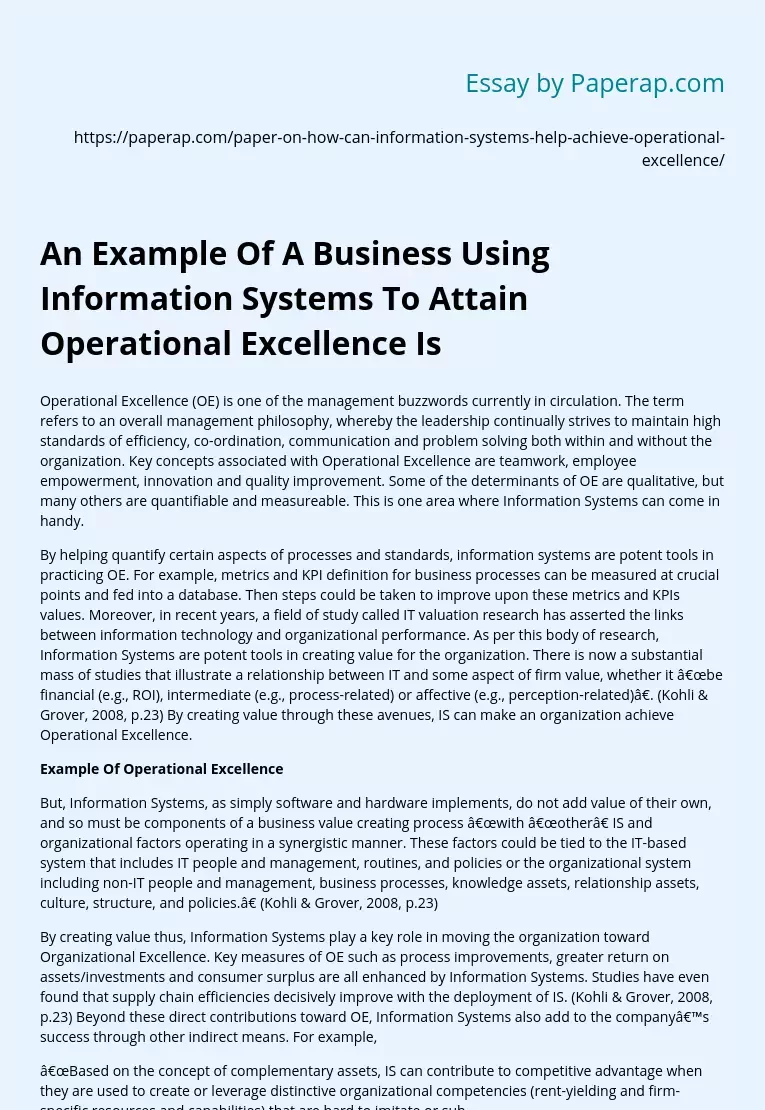Business Using Information Systems for Operational Excellence
Operational Excellence (OE) is one of the management buzzwords currently in circulation. The term refers to an overall management philosophy, whereby the leadership continually strives to maintain high standards of efficiency, co-ordination, communication and problem solving both within and without the organization. Key concepts associated with Operational Excellence are teamwork, employee empowerment, innovation and quality improvement. Some of the determinants of OE are qualitative, but many others are quantifiable and measureable. This is one area where Information Systems can come in handy.
By helping quantify certain aspects of processes and standards, information systems are potent tools in practicing OE. For example, metrics and KPI definition for business processes can be measured at crucial points and fed into a database. Then steps could be taken to improve upon these metrics and KPIs values. Moreover, in recent years, a field of study called IT valuation research has asserted the links between information technology and organizational performance. As per this body of research, Information Systems are potent tools in creating value for the organization.
There is now a substantial mass of studies that illustrate a relationship between IT and some aspect of firm value, whether it “be financial (e.g., ROI), intermediate (e.g., process-related) or affective (e.g., perception-related)”. (Kohli & Grover, 2008, p.23) By creating value through these avenues, IS can make an organization achieve Operational Excellence.
Example Of Operational Excellence
But, Information Systems, as simply software and hardware implements, do not add value of their own, and so must be components of a business value creating process “with “other” IS and organizational factors operating in a synergistic manner.
These factors could be tied to the IT-based system that includes IT people and management, routines, and policies or the organizational system including non-IT people and management, business processes, knowledge assets, relationship assets, culture, structure, and policies.” (Kohli & Grover, 2008, p.23)
By creating value thus, Information Systems play a key role in moving the organization toward Organizational Excellence. Key measures of OE such as process improvements, greater return on assets/investments and consumer surplus are all enhanced by Information Systems. Studies have even found that supply chain efficiencies decisively improve with the deployment of IS. (Kohli & Grover, 2008, p.23) Beyond these direct contributions toward OE, Information Systems also add to the company’s success through other indirect means. For example,
“Based on the concept of complementary assets, IS can contribute to competitive advantage when they are used to create or leverage distinctive organizational competencies (rent-yielding and firm-specific resources and capabilities) that are hard to imitate or substitute. Firms whose IS complement their distinctive organizational competencies may be able to create a complex set of complementary resources that are not easily matched by competitors. Since strategic flexibility represents a valuable, firm-specific and hard-to-copy organizational capability, firms using IS to support the development of strategic flexibility may generate competitive advantage and superior firm performance.” (Zhang, 2006, p.84)
Hence, there are numerous ways through which Information Systems could help companies march toward Organizational Excellence.
Works Cited
Kohli, Rajiv, and Varun Grover. “Business Value of It: an Essay on Expanding Research Directions to Keep Up with the Times .” Journal of the Association for Information Systems 9.1 (2008): 23+.
Zhang, Michael J. “IS Support for Strategic Flexibility, Environmental Dynamism and Firm Performance.” Journal of Managerial Issues 18.1 (2006): 84+.
Managers will do well to follow ethical principles while discharging their duties of Information Management. Information Systems managers face ethical dilemmas numerous times during their tenure and following a set ethical guidelines is quite useful. Firstly, when confronted by an ethical dilemma, managers will analyze the situation by evaluating the possible consequences of various options they have at disposal. They will consider the impact of each option on various stakeholders in the company and choose to be as fair and just as circumstances allow them. Most determining factors would be specific to the particular ethical dilemma at hand. Along with the particular details of the problem, IS managers can peruse some time-tested, universal ethical principles in arriving at their decisions.
The first one is “Do unto others as you would have them do unto you”, which is an old proverb with Christian associations. (Laudon & Laudon, p.419) Putting oneself in .
Business Using Information Systems for Operational Excellence. (2019, Dec 05). Retrieved from https://paperap.com/paper-on-how-can-information-systems-help-achieve-operational-excellence/

